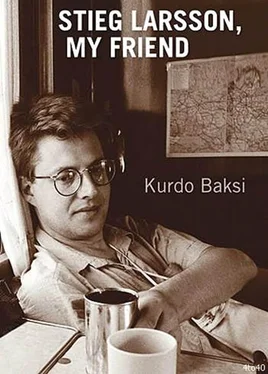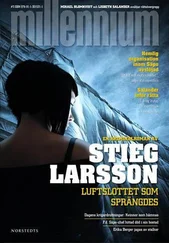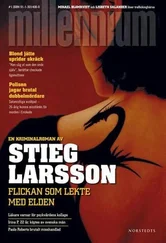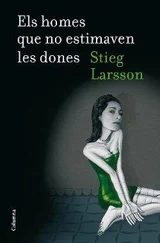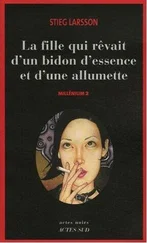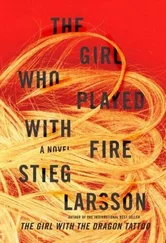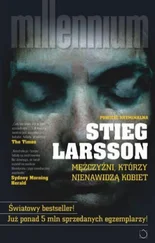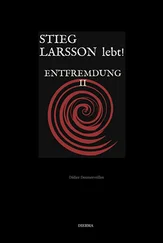I had realized this long before the sad-looking cod and overcooked potatoes landed on the table with a thud.
*
How can you get to know somebody who hardly ever talks about his private life? That’s something I’ve often thought about. Whenever Stieg entered a room, he automatically became the centre of attention. Despite that, it was impossible to regard him as anything other than unpretentious.
Some people would no doubt maintain that the fact he spoke so little about himself and was always keen to avoid the limelight was due to his northern Swedish origins. He often reminded people that he was, for better or worse, from the far north. He actually said as much the very first time we spoke, during that brief telephone call. He referred to his northern origins and the fact that he had been involved in politics while still clinging to his mother’s apron strings – those two basic facts about Stieg are impossible to ignore.
You may be born a northerner, but being involved in politics is something else entirely. Stieg’s burning interest in politics was aroused as early as 1968, when he was fourteen years old. He was lucky in that his mother, Vivianne, was devoid of prejudice and loved to indulge in long political discussions. He spent hours talking to her about starvation in Biafra, Soviet aggression or the Vietnam War – much of his passion for justice can doubtless be traced back to conversations with his mother in their kitchen. Contemporaries also attest that Stieg’s mother was a gifted storyteller; perhaps he learned a few tricks from her, who knows?
The 1970s were a politically charged decade, and Stieg was hardly the only fourteen-year-old to protest against the Vietnam War by joining the National Liberation Front. Even at secondary school he contributed polemical articles to newspapers and magazines.
Nevertheless, his political involvement cannot be explained exclusively by the trends of the time or some kind of teenage revolt. It was a built-in part of his character, just like his northern origins.
There are few aspects of my life that cannot be traced back to the fact that I am a Kurd. The inevitability of my being an outsider is obviously associated with my origins. I am closely linked with a people that is either disowned or opposed. This fact is an important part of my make-up and my memories, and it has inevitably formed what interests and drives me.
But the feeling of being an outsider can manifest itself in many different ways. There is no doubt that Stieg also felt that he was excluded. In his case it was due largely to his working-class background, but also to his political sympathies. I think this is why he never went to university and instead built his career on his trade union activities. A characteristic of trade unionists is that they often work full-time during the day in order to earn a living, devoting themselves to the things that really interest them – together with others similarly minded – in their spare time. Perhaps this doesn’t apply to everybody, but it certainly applied to Stieg. He went out of his way to ensure that he always had a secure job, and after an eight-hour working day he would turn his full attention to anti-racist activities.
The project he was most proud of was his contribution as Nordic correspondent to the British magazine Searchlight . He often told me about his assignments in Grenada and Eritrea. In a way, perhaps, it was revenge for being rejected by the Stockholm College of Journalism on the grounds that his school leaving grades were not good enough. We had been friends for a long time before I heard about that. I tried to imagine how Stieg must have felt. He was passionate about writing on important matters and knew he could do it as well as anybody; but he failed to gain a place on a course which would have made things easier for him in many ways – work experience posts on a variety of newspapers, opportunities to build up a network of contacts while being trained.
What did it feel like for a working-class boy from the remote north of Sweden to find the door slammed in his face? I think it was a setback that scarred Stieg for life. He once told me in confidence that if there was one person he admired, it was his grandfather Severin Boström, for his determined opposition to Hitler during the Second World War – activities that continued long after the peace treaty was signed in 1945. Perhaps it was his grandfather who was the inspiration for Stieg’s education in the university of life, far from Stockholm and academia, and who convinced him that a man can achieve a lot if he is passionate about a cause.
Expo – blowing the whistle on extremism
Baobab trees thrive best on the savannah, where they tower majestically over the flat grassland. The branches are magnificent, but look a bit awkward compared with the enormous trunks. A baobab tree needs well-drained soil and is unique in that it can suck up such a large amount of water that it survives even long periods of drought. But it is extremely sensitive to rot and dislikes the cold. It is also known as the monkey-bread tree, after its pear-like fruits. Presumably monkeys are especially fond of them.
If you glance quickly at a baobab tree, it almost looks as if it is growing upside down. A substantial trunk some twenty metres tall, with a small crown at the top. It is hardly surprising that there are many folktales and legends about the baobab. Most of them claim that a god became so angry with the tree that he pulled it up, roots and all, then replanted it with the branches downwards.
I sometimes suggest that idealistic, not-for-profit magazines are like the baobab tree. The difference is that magazines suck up money rather than water. But what decides whether a magazine will survive or not is how long it can keep going during long periods of drought.
Without a doubt, the most important project in Stieg’s life was the magazine Expo , which he and others founded as a result of his belief that it was essential to create a Swedish version of Searchlight . His view was hardly surprising: the situation in Sweden was deteriorating in a worrying way. In the 1994 elections, the Sweden Democrats polled almost fourteen thousand votes, which gave them five seats on local councils. In 1988 they had received 1,118 votes and in 1991 4,887. In other words, they were expanding quickly – disturbingly quickly. In 1991 they had won two local council seats without causing much of a reaction.
The established parliamentary parties were not at all sure how to deal with the situation and tended to wash their hands of it, treating it as an aberration. But it turned out to be an aberration that developed into something much bigger. In the 2006 elections the Sweden Democrats got 162,463 votes and won 281 local council seats. This boil on the skin of Swedish democracy was the main reason why Expo came into existence.
During the years it took to build Expo up from nothing, Stieg had to endure his fair share of successes and droughts. I was able to observe his indefatigability over and over again. Sometimes I am convinced that Expo cut Stieg’s life short, because of all the threats it received and the financial crises it suffered. Other times I have the feeling that it was thanks to Expo that Stieg was able to find the space his creativity needed – it was almost as if it provided the air he required in order to breathe.
Stieg’s relationship with Expo – it really is possible to see it as a relationship between two people – was filled with happiness, creativity, setbacks and complications. Not least with love. The staff were a collection of young and hungry journalists keen to face up to big challenges. Stieg stood out for many reasons, one being his experience – in the mid-1980s he was among those who launched the anti-violence project Stop Racism. Moreover, he was the only one at the magazine over thirty.
Читать дальше
